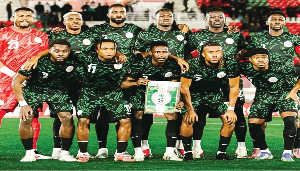A fresh controversy has emerged over the neutrality of Justice Kumai Bayang Akaahs, a retired Supreme Court judge who served as the sole arbitrator in the high-stakes dispute between First Bank of Nigeria Limited and General Hydrocarbons Limited.
A group of stock market whistleblowers, in a statement seen by PREMIUM TIMES on Friday, questioned Justice Akaahs’ appointment, alleging that he owns 595,057 shares in FBN Holdings Plc (FBNHoldco), the parent company of First Bank.
The group claimed that 148,888 units of those shares were purchased as recently as 7 April 2025. They also listed shares the retired judge allegedly holds in several other publicly listed companies, including Daar Communications, Dangote Sugar, Ecobank Transnational Incorporated, GTCO, MTN Nigeria, UBA, Lafarge Africa and Zenith Bank.
Invoking the Whistleblower Policy of the Ministry of Finance and provisions of the ICPC Act, the informants said they were acting to protect market integrity and ensure full disclosure in sensitive financial disputes.
“We wonder how an active FBNHoldco shareholder could be a sole arbitrator in a matter involving First Bank, a company in which he holds significant shares, without disclosure and without recusing himself,” the whistleblowers wrote.
They alleged that “his shareholding in FBNHoldco, which represents his highest holding in his stock portfolio, was not disclosed” in the arbitral proceedings and called for “a full and comprehensive investigation.”
However, when contacted by PREMIUM TIMES, Justice Akaahs confirmed holding the shares in question, but said he disclosed them to the Nigerian Institute of Chartered Arbitrators (NICArb).
Efforts to confirm this from NICArb’s Registrar/Chief Executive, Shola Oshodi-Ojo, were unsuccessful. Multiple calls, text messages and emails over three days went unanswered.
The Arbitration and Award
The Nigerian Institute of Chartered Arbitrators (NICArb) appointed Justice Akaahs sole arbitrator on 13 February 2025, according to an appointment letter sighted by PREMIUM TIMES.
General Hydrocarbons—majority-owned by media entrepreneur Nduka Obaigbena—had initiated arbitration after a breakdown in its financing relationship with First Bank under a 2021 subrogation agreement linked to OML 120 oil field development.
On 27 October 2025, Justice Akaahs issued a sweeping award in favour of First Bank. He ordered General Hydrocarbons to pay $112,100 and ₦111.25 million in legal and arbitration costs within 30 days, attracting 10 per cent annual interest thereafter.
He dismissed all of General Hydrocarbons’ claims, including allegations that First Bank breached financing obligations, sabotaged alternative funding, and caused operational losses.
The tribunal held that First Bank’s financing duties were conditional, not absolute, and that General Hydrocarbons failed to prove any breach.
Legal experts argue over whistleblowers’ claims
Legal experts consulted by PREMIUM TIMES disagree with the whistleblowers’ interpretation of conflict-of-interest rules.
Two senior lawyers who asked not to be named (so as not to be seen commenting on an ongoing dispute) argued that the shareholding is insignificant and falls within the Green List of the International Bar Association’s (IBA) Guidelines on Conflicts of Interest in International Arbitration.
The Guidelines state that Green List scenarios present “no appearance and no actual conflict of interest … [and] the arbitrator has no duty to disclose situations falling within the Green List.”
A Senior Advocate of Nigeria (SAN) cited Section 4.4.2 of the Guidelines, which provides that an arbitrator need not disclose where “the arbitrator holds an insignificant amount of shares in one of the parties, or an affiliate … which is publicly listed.”
“With over 42 billion outstanding shares of FBNHoldco, the retired justice’s 595,057 units are insignificant,” the SAN said.
Another senior lawyer described the controversy as “ridiculous,” adding that Justice Akaahs is widely regarded as incorruptible.
“He was the judge who refused to be compromised in the Anambra Election Tribunal years ago, a case that led to the forced retirement of several justices,” the lawyer said. “It is rather late at over 70 for him to start learning to be left-handed when he has always been right-handed.”
But an Abuja-based lawyer, Frank Tietie, rejected the Green List defence, arguing that the IBA Guidelines were being misinterpreted.
He said the real issue was not the percentage of shares held relative to market size, but whether the arbitrator had a financial interest that could be affected by the outcome.
“The Green List applies only to insignificant interests in public companies not directly affected by the arbitration. That condition is plainly absent,” he said.
“First Bank’s parent company, FirstHoldco, would clearly feel the economic impact of a liability exceeding $700 million. That affects profitability, consolidated accounts, and potentially share value.”
According to him, this places the matter outside the Green List and into the Non-Waivable Red List, which covers situations where an arbitrator holds a financial interest in a party or affiliate that stands to gain or lose from the award.
“Under the IBA Guidelines, what matters is not the percentage of market capitalisation, but whether the arbitrator stands to benefit or suffer financially from his own decision. In this case, the answer is yes,” he said.
Business News of Wednesday, 19 November 2025
Source: www.premiumtimesng.com













